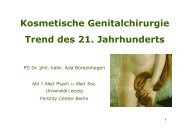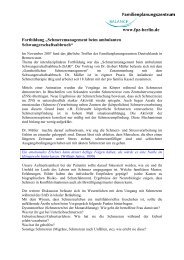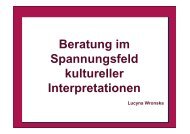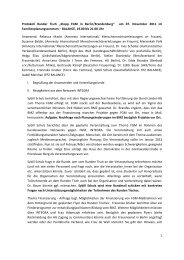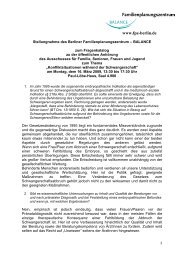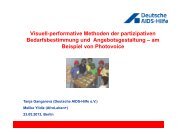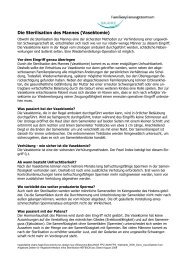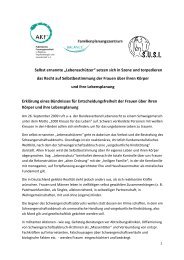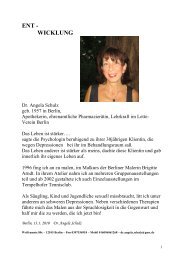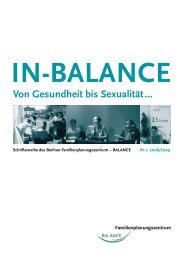Listening to African Voices - FPZ
Listening to African Voices - FPZ
Listening to African Voices - FPZ
You also want an ePaper? Increase the reach of your titles
YUMPU automatically turns print PDFs into web optimized ePapers that Google loves.
“As I said, for a number of practitioners, female circumcisionwrongly represents religion. It is not religious. It hasnothing <strong>to</strong> do with the worship of God. Those who doit might have their own explanations about the advantageof circumcising a woman. But <strong>to</strong> me, I only seethe disadvantages in the fact that it injures not only thephysical body of the girl but her mental being, <strong>to</strong>o. Itsimpact stays throughout her life with her. When we sayGod created man and the woman out of him, all the bodyorgans, they were created with what is important. So cuttingaway an organ is not only painful <strong>to</strong> the person wholost part of his body, but also <strong>to</strong> God who created manfully equipped with important organs.” (39 year old keyinformant and religious leader of Ethiopian origin)5.5.9.6. Perception of disadvantages and knowledge of risksand consequencesThere was a general awareness among participants ofEthiopian origin about the harm of FGM/C: almost 85%brought up one or more risks or negative effects during theinterviews. Men and women were equally well informed. Themost frequently named risks or effects were pain, infections,bleeding and sexual problems. Some participants mentionedhow the latter effect led <strong>to</strong> conjugal problems:“I believe that my being circumcised contributed somehow<strong>to</strong> the divorce from my German husband.” (womanof Ethiopian origin)“My husband used <strong>to</strong> tell me that I was not motivated forunion because of the circumcision I had gone through.”(woman of Ethiopian origin)5.5.9.7. Knowledge of German law and attitudes <strong>to</strong>wards theabandonment of FGM/CIt is known by the majority (54 persons) of the interviewedEthiopian community that FGM/C is not permitted by Germanlaw. Five people answered that FGM/C is not specificallymentioned in the German legislation and 19 personsdeclared uncertainty. Women are slightly more likely <strong>to</strong> beaware of the legislation than men.There is a strong proportion of voices within the Ethiopianimmigrant community – men and women alike – in favourof s<strong>to</strong>pping FGM/C: 69 out of 78 participants pronouncedthemselves in favour of the abandonment of the practice.Only one woman, a 73 year old grandmother visiting herdaughter in Hamburg advocated its continuation. Four participantsfelt that it depended on the situation and four otherparticipants felt uncertain about their opinion regarding thefuture of the practice. It was communicated clearly, however,that none of the participants could imagine practicingFGM/C in Germany or subjecting their daughters <strong>to</strong> thepractice during holidays in Ethiopia.5.5.10. Burkina Faso5.5.10.1. Socio-demographic profileThe Burkinabe community in Hamburg is mainly composedof men: among the 190 registered immigrants, there are 154men and 36 women. We reached a solid proportion of 75participants, but interviewed mainly men (66) and had difficultiesgetting hold of the women; we ended up completingthe interviews with only 9 women.5.5.10.2. Proportion of immigrant population concernedThe DHS for Burkina Faso estimates that 77% of the womenin the country have undergone FGM/C. All the main ethnicgroups adhere <strong>to</strong> the practice with prevalence rates of about85%. There is only one region in Burkina Faso, the CentralWest, where the proportion of women who have undergoneFGM/C is considerably lower than in other regions. It is at44% while all other regions have prevalence estimates of60% and above (INSD Burkina Faso & ORC Macro 2004).All participants are from practicing ethnic groups and thegreater part (55 out of 75 persons = 74%) is also frompracticing families; 13 participants claimed <strong>to</strong> be from nonpracticingfamilies and six participants either did not knowor did not answer the question.5.5.10.3. Women and girls concernedFive out of the nine women interviewed reported <strong>to</strong> haveundergone FGM/C at between 0 and 5 years of age. One ofthe women stated more precisely that she had been infibulatedand sewn closed.Among the interviewees of Burkinabe origin, 30 participantswere parents of daughters: the <strong>to</strong>tal number of daughterswas 38, the majority (33) living in Germany.Of the 38 girls, 4 daughters (of three men interviewed) hadbeen subjected <strong>to</strong> FGM/C. The four girls are currently livingin Hamburg, but were born in Burkina Faso and underwentFGM/C before arriving in Germany. They were taken <strong>to</strong>a traditional practitioner at a very young age. Two of thefathers shared the fact that the girls had been taken bymembers of the extended family and that the fathers hadbeen informed only afterwards about what had happened.“Female circumcision is a reality in my area of origin andin particular in my family. It is a woman’s affair. Whenthey circumcised my two daughters, I was only informed68<strong>Listening</strong> <strong>to</strong> <strong>African</strong> <strong>Voices</strong>





